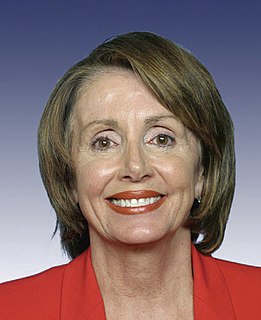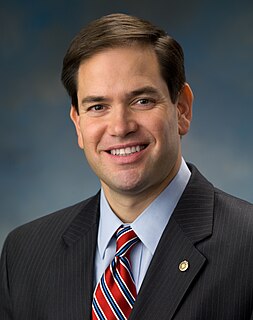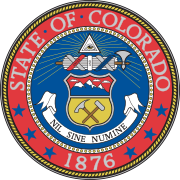
The 2008 United States Senate elections were held November 4, 2008, with 35 of the 100 seats in the Senate being contested. Thirty-three seats were up for regular elections; the winners were eligible to serve six-year terms from January 3, 2009 to January 3, 2015, as members of Class 2. There were also two special elections, the winners of those seats would finish the terms that ended January 3, 2013.

The 2006 United States House of Representatives elections were held on November 7, 2006, to elect members to the United States House of Representatives. It took place in the middle of President George W. Bush's second term in office. All 435 seats of the House were up for election. Those elected served in the 110th United States Congress from January 3, 2007, until January 3, 2009. The incumbent majority party, the Republicans, had won majorities in the House consecutively since 1994, and were defeated by the Democrats who won a majority in the chamber, ending 12 years in opposition.

The 2006 Texas gubernatorial election was held on November 7, 2006 to elect the Governor of Texas. The election was a rare five-way race, with incumbent Republican Governor Rick Perry running for re-election against Democrat Chris Bell and Independents Carole Keeton Strayhorn and Kinky Friedman, as well as Libertarian nominee James Werner. Perry was re-elected to a second full term in office, winning 39% of the vote to Bell's 30%, Strayhorn's 18% and Friedman's 12%.

Edwin George Perlmutter is an American politician and the U.S. Representative for Colorado's 7th congressional district, serving since 2007. The district is located in the northern and western suburbs of Denver metropolitan area. He is a member of the Democratic Party.

The Arizona 8th congressional district election, 2006 was an election for the United States House of Representatives for the open seat of incumbent Jim Kolbe (R), who was not running for re-election. The primary was held on September 12, 2006, and the two major party winners were Republican Randy Graf, a former state Representative who challenged Kolbe for the GOP nomination in 2004, and former State Senator Gabrielle Giffords. Libertarian Dave Nolan, who was uncontested in the primary, was also in the November 7, 2006 general election. Graf was considered too conservative for the district: Kolbe withheld his endorsement, and towards the end of the election the National GOP pulled their support. By election time, most non-partisan analyses considered this race the most likely district to switch hands, which it did, as Giffords won a decisive victory, 54% to 42%.

The 2006 United States House of Representatives elections in Colorado were held on November 7, 2006, with all seven House seats up for election. The winners served from January 3, 2007 to January 6, 2009.

The 2008 Republican presidential primaries were the selection process by which voters of the Republican Party chose its nominee for President of the United States in the 2008 U.S. presidential election. Senator John McCain of Arizona was selected as the nominee through a series of primary elections and caucuses culminating in the 2008 Republican National Convention held from Monday, September 1, through Thursday, September 4, 2008, in St. Paul, Minnesota. President George W. Bush was ineligible to be elected to a third term due to the term limits established by the 22nd Amendment.

The 2008 congressional elections in Colorado were held on November 4, 2008 to determine who will represent the state of Colorado in the United States House of Representatives, coinciding with the presidential and senatorial elections. Representatives are elected for two-year terms; those elected served in the 111th Congress from January 6, 2009 until January 3, 2011.

On November 7, 2006, New York, along with the rest of the country held elections for the United States House of Representatives. Democrats picked up 3 House seats, the 19th, the 20th, and the 24th.

The 2012 Republican presidential primaries were the selection processes in which voters of the Republican Party elected state delegations to the Republican National Convention. The national convention then selected its nominee to run for President of the United States in the 2012 presidential election. There were 2,286 delegates chosen, and a candidate needed to accumulate 1,144 delegate votes at the convention to win the nomination. The caucuses allocated delegates to the respective state delegations to the national convention, but the actual election of the delegates were, many times, at a later date. Delegates were elected in different ways that vary from state to state. They could be elected at local conventions, selected from slates submitted by the candidates, selected at committee meetings, or elected directly at the caucuses and primaries.

The 2010 United States Senate special election in Delaware took place on November 2, 2010 concurrently with elections to the United States Senate in other states as well as elections to the United States House of Representatives and various state and local elections. It was a special election to fill Delaware's Class II Senate seat, then held by Ted Kaufman, an appointee. The seat had been previously held by long-time Senator Joe Biden, who vacated it when he became Vice President of the United States in 2009.

The 2010 Colorado gubernatorial election was held on Tuesday, November 2, 2010 to elect the Governor of Colorado, who would serve a four-year term that began in January 2011. John Hickenlooper won the race with over 50% of the vote. Incumbent Democratic Governor Bill Ritter announced that he would not run for re-election in 2010. Dan Maes claimed the Republican nomination in the primary with 50.6% of the vote and a 1.3% margin over rival Scott McInnis. In claiming victory, Maes called on Constitution Party candidate and former Republican Congressman Tom Tancredo to "stop your campaign tonight." John Hickenlooper was unopposed for the Democratic nomination.
The 2010 congressional elections in Virginia were held November 2, 2010, to determine who will represent the state of Virginia in the United States House of Representatives. Representatives are elected for two-year terms; those elected served in the 112th Congress from January 2011 until January 2013.

The 2010 congressional elections in Colorado were held on November 2, 2010 to determine who will represent the state of Colorado in the United States House of Representatives. Representatives are elected for two-year terms; those elected will serve in the 112th Congress.

Kerry Bentivolio is an American politician and actor who is the former United States Representative for Michigan's 11th congressional district, in office from 2013 to 2015. Bentivolio, a Republican, defeated Democratic nominee Syed Taj, a physician, in the November 6, 2012 election. The seat was vacated by Representative Thaddeus McCotter, who resigned from Congress on July 6, 2012, and was briefly held by Democrat David Curson of Belleville, Michigan. He was defeated for the Republican nomination in his bid for a second term by attorney David Trott. He launched a write-in campaign for the November 2014 general election but lost again to Trott. After Trott announced he was not seeking reelection in 2018, Bentivolio again sought election in the eleventh district, but finished last in the primary.

The 2016 Republican Party presidential primaries and caucuses were a series of electoral contests taking place within all 50 U.S. states, the District of Columbia, and five U.S. territories, occurring between February 1 and June 7. Sanctioned by the Republican Party, these elections are designed to select the 2,472 delegates to send to the Republican National Convention, who selected the Republican Party's nominee for President of the United States in the 2016 election, Donald Trump. The delegates also approved the party platform and vice-presidential nominee.

The 2014 United States Senate election in Delaware was held on November 4, 2014 to elect a member of the United States Senate to represent the State of Delaware, concurrently with other elections to the United States Senate in other states and elections to the United States House of Representatives and various state and local elections.

The 2014 United States House of Representatives elections in Colorado will be held on Tuesday, November 4, 2014 to elect the seven U.S. Representatives from the state of Colorado, one from each of the state's seven congressional districts. The elections will coincide with the elections of other federal and state offices, including Governor of Colorado and U.S. Senator.

The Colorado Republican caucuses took place in early April in the U.S. state of Colorado, as a part of the Republican Party's series of presidential primaries ahead of the 2016 presidential election. The Colorado contest consisted of a series of congressional district conventions on April 2, 7 and 8 and a state convention on April 9. A non-binding "beauty contest" caucus was held March 1 to coincide with the Super Tuesday conventions. Ted Cruz won a majority of delegates in the convention.

The 2018 United States House of Representatives elections in Colorado were held on November 6, 2018, to elect the seven U.S. Representatives from the state of Colorado, one from each of the state's seven congressional districts. The Republican and Democratic Party primaries in Colorado were held on June 26, 2018. The elections coincided with the gubernatorial election, as well as other elections to the House of Representatives, elections to the United States Senate and various state and local elections.
















